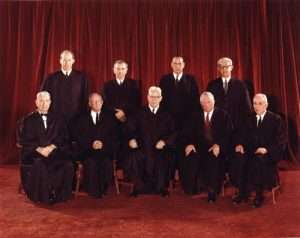The Volokh Conspiracy
Mostly law professors | Sometimes contrarian | Often libertarian | Always independent
Today in Supreme Court History: October 31, 1963
10/31/1963: Cleveland Police Detective patted down, and arrested John W. Terry.

Editor's Note: We invite comments and request that they be civil and on-topic. We do not moderate or assume any responsibility for comments, which are owned by the readers who post them. Comments do not represent the views of Reason.com or Reason Foundation. We reserve the right to delete any comment for any reason at any time. Comments may only be edited within 5 minutes of posting. Report abuses.
Please to post comments


What has happened since is that Terry stops have been used to pat-down individuals even when there is no reasonable basis for conducting the pat-down. In Terry, the officer made a long observation of the suspect to develop his reasonable suspicion. In modern practice, officer tend to not develop this reasonable suspicion and instead engage in pat-downs based solely on a hunch. Furthermore, the use of a Terry stop has extended into the use of a pat-down to suppress the drug trade.
Terry v Ohio granted that a stop and frisk for officer safety was justified on the reasonableness standard as a matter of officer safety and that of the public:
“The officer's search was confined to what was minimally necessary to determine whether the men were armed, and the intrusion, which was made for the sole purpose of protecting himself and others nearby, was confined to ascertaining the presence of weapons.”
This has now been extended by law enforcement to allow a stop and frisk of an individual for suspicion of possessing illicit drugs or drug paraphernalia. The pretense of officer safety no longer applies or as pretty much every officer will say in their testimony, for my own safety I did a pat-down and felt a bulge (or whatever) in the suspect’s outer garment. Of course the problems with this are many. But it ought to be quite clear officer safety is not jeopardized by a bulge in a suspect’s outer garment that could be any number of things, none of which present a danger to anyone.
Obtaining consent is also problematic in this situation but perhaps that is left to a different discussion. Suffice it to say consent is not always as clear cut as it might appear on paper.
I would suggest this is how the war on drugs has made a mockery of constitutional protections, by taking the narrow limits such as the reasonable frisk of an individual based on a totality of circumstances for the purpose of officer safety and turning that into a search for drugs.
You accurately point out where LEOs can get around Terry, and how the War on Drugs trumped our legal protections.
How would you suggest narrowing the scope, or constraining the ability of LEOs to stop and frisk?
First, end the war on drugs. I believe many remedies result from that. Second, something I rarely see in preliminary hearings, a defense lawyer who questions the reasonableness of the frisk rather than accept the “safety” claim of the officer.
But ending the drug war will, IMO, result in far fewer frisk incidents to contest.
The only permanent fix would be to remove the word “reasonable” from the 4th Amendment. I see that as highly unlikely.
Appreciate the responses. Agree re: end the drug war.
Obtaining valid(informed and voluntary) consent is also impossible in this situation
FTFY.
It is interesting you say this. I have observed this several dozen times in the field. People will tend to give consent for many reasons. Whether they voluntarily give consent or feel compelled in some manner is difficult or impossible to determine.
Perhaps with the advent of the body camera, a jury will have the ability to better make that determination themselves. But even that is imperfect.
Though nothing is perfect, a consent form signed by the person, before a frisk, would be useful but also most likely impractical.
I'd eliminate it.
If you're a police officer and have a suspicion but not probable cause, I'm free to not answer your questions, except my basic identity. Why do you have to disarm me to ask me my name? By the time you finish patting me down the interaction could have been over already.
If you want to try to talk to me beyond that point, fine, but at that point you aren't using your police powers to talk to me. Insisting on disarming me would be like if a random person was on a street corner trying to get people to sign a petition, and patted them down before asking them to sign. They don't get to do that (even if it's a dangerous neighborhood); why should police?
https://www.findlaw.com/legalblogs/criminal-defense/can-you-refuse-to-identify-yourself-to-police-officers/
" Cleveland Police Detective patted down, and arrested John W. Terry. "
The crime is that context was committed by a comma.